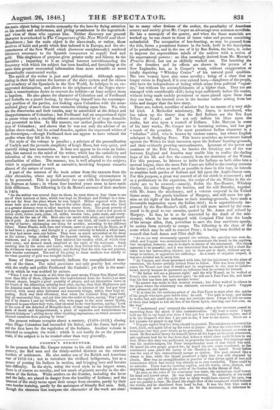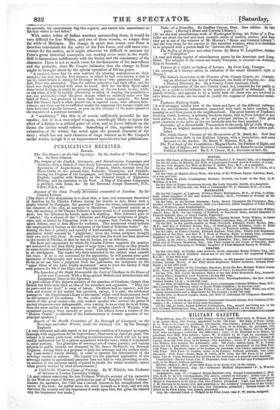COOPER'S BEE-HUNTER.
IN the present fiction Mr. Cooper returns to his old friends and his old scenery, the Red men and the thinly-settled districts on the extreme borders of settlement. He also makes use of the British and American war of 1812.14; not to introduce the civilized belligerents, but as a Means of putting his Indians in motion, and bringing hero and heroine into difficulty. In the style, using the word style in its largest sense, there is of course no novelty, and not much of generic novelty in the ele- ments of the fiction. White settlers on the frontier, including the lover !Ind the lady, are placed in danger from the hostility of Indians ; and the Interest of the story turns upon their escape from enemies, partly by their own border training, partly by the assistance of friendly Red men. Still, though the elements that compose the character of the work are simi- lar to many other fictions of the author, the peculiarity of American scenery and society gives Mr. Cooper an advantage over common novelists. He has a monopoly of the quarry, and when the finest materials are worked up he can resort to those of lesser value and present something unbacknied. The occupation of bee-hunting, as may be guessed from the title, forms a prominent feature in the book, both in the description of its peculiarities, and in the use of it by Ben Boden, the hero, in order to impress the superstitious minds of the natives with a notion of his supernatural powers : an idea seemingly derived from Mr. Murray's Prairie Bird, but not so skilfully worked out. The besetting sin of the frontiers and its effects are shown in the person of a New Englander, but, as is Cooper's wont, without exaggeration or totally depriving " Whiskey Centre" of his natural good qualities. The two women have also some novelty ; being of a class that no longer exists in England, if it ever existed here,—daughters of the people, who have the independence of feeling which arises from political " equal- ity," but without the accomplishments of a higher class. They too are managed with considerable skill ; being kept sufficiently before the reader, without being made unduly prominent or more placed upon them than they can bear, the interest even in the heroine rather arising from her risks and danger than the love story. There are, indeed, novelties of another but by no means of a very skil- ful kind. A Methodist missionary, Mr. Amen, is introduced, who has taken up the theory that the Red Indians are the Ten Lost Tribes of Israel ; and he not only infficts his ideas- upon the reader, but also upon a council of Indians. Like Marryat in some of his later works, Mr. Cooper too is becoming serious, and has got a touch of the preacher. The most prominent Indian character is a " tribeless " chief, who is known by various names, but whose English sobriquet is Scalping Peter. This brave nourishes an inveterate hatred against the Whites for their intrusion upon the Indians' hunting-grounds, and their evidently growing encroachments. Ignorant of the power and numbers of the Pale Faces, he fancies the breaking out of the war between England and America may enable him to realize the darling hope of his life and free the country from the dominion of the Whites. For this purpose, he labours to incite the Indians on both sides into a mutual league, since the more Pale Faces are killed in the coming contests the better ; and when as much as possible is done in this way, he intends to combine both parties of Indians and fall upon the Anglo-Saxon race. For this purpose, a great war council of all the chiefs is summoned ; and as a preliminary to the expulsion, the scalps of the six Whites in the vi- cinity are to be secured,--namely, Boden the Bee-Hunter, Whiskey Centre, his sister Margery the heroine, and his wife Dorothy, together with Mr. Amen the missionary, and a veteran corporal in the United States army. The gentle kindness of Margery, and still more her opi- nion on the right of the Indians to their hunting-grounds, have made a favourable impression upon the Indian chief; he is superstitiously im- pressed by the Bee-Hunter's skill, and is still more moved by the com- mand to do good to our enemies, quoted by Mr. Amen and echoed by Margery. In fine, he is so far converted by the death of the mis- sionary, whom he has entrapped with Corporal Flint into the hands of his savage allies, that, powerless to save the four survivors openly, he assists them covertly to escape. The following is the close of the scene which may be said to convert Peter ; it having been decided at the council that both Amen and Flint shall die.
"As no one very strenuously opposed the scheme, the question was soon de. coded, and Ungque was commissioned to communicate the result to the captives. One exception, however, was to be made in favour of the missionary. His object appeared to be peaceful; and it was determined that he should be led a short dis- tance into the surrounding thicket, and be there put to death, without any at- tempt to torture, or aggravate his sufferings. As a mark of singular respect, it was also decided not to scalp him.
"As Ungque, and those associated with him, led the missionary to the place of execution, the former artfully invited Peter to follow. This was done simply be- cause the Weasel saw that it would now be unpleasant to the man he hated— hated, merely because he possessed an influence that he coveted for himself. "My father will sees pleasant sight,' said the wily Weasel, as he walked at Peter's aide towards the indicated spot; 'he will see Is Pale Face die, and know that his foot has been put upon another worm.' "No answer was made to this ironical remark; but Peter walked in silence to the place where the missionary was stationed, surrounded by a guard. Ungque now advanced, and spoke.
" It is time for the medicine-priest of the Pale Faces to start after the spirits of his people who have gone before him,' he said. 'The path is long; and unless he walks fast and starts soon, he may not overtake them. I hope he will see some of them that helped to kill the Son of his Great Spirit, starving, and foot-sore, on the way.'
" I understand you,' returned the missionary, after a few moments passed in recovering from the shock of this communication. My hour is come. I have held my life in my, hand ever since I first put foot in this heathen region; and if it be the Creator's will that I am now to die, I bow to the decree. Grant me a few minutes for prayer to my God.' " Ungque signed that the delay should be granted. The missionary uncovered his head, knelt, and again lifted up his voice in prayer. At first the tones were a little tremulous; but they grew firmer as he proceeded. Soon they became as serene as usual. He first asked mercy for himself, threw all his hopes on the great atonement,
and confessed how far he was from that holine-s which alone could fit him to see God. When this duty was performed, he prayed for his enemies. The language used was his mother-tongue, but Peter comprehended most of that which was said.
He heard his own people prayed for he heard his own name mentioned, as the condemned man asked the mercy of the Manitou in his behalf. Never before was the soul of this extraordinary savage so shaken. The past seemed like a dream to him, while the future possessed a light that was still obscured by clouds. Here was an exemplification in practice of that divine spirit of love and benevolence which had struck him already as so very wonderful. There could be no mistake. There was the kneeling captive, and his words, clear, distinct, and imploring, ascended through the cover of the bushes to the throne of God. "As soon as the voice of the missionary was mate, the mysterious chief bowed his head and moved away. He was then powerless. No authority of his could save the captive; and the sight that so lately would have cheered his eyes, was now too painful to bear. He heard the single blow of the tomahawk which brained the victim, and he shuddered from head to foot. It was the first time such a weakness had ever come over him. As for the missionary, in deference to his pursuits, his executioners dug him a grave, and buried him unmutiLated on the spot where he had fallen."
With entire tribes of Indian warriors surrounding them, it would be , very difficult for four Whites, and two of them women, to escape from the wilds of Michigan. The change in spirit that comes over Peter is therefore convenient for the safety of the Pale Faces, and still more con- venient for the author, as it might otherwise be difficult to account for Peter's great historical conception not making more noise in the world. Still it harmonizes indifferently with the fiction and the consistency of the character. There is not so much room for the discussion of the marvellous and the probable, since Mr. Cooper intimates that the change in Peter might be brought about by the special operation of Divine grace. "A hundred times had he seen warriors die uttering maledictions on their enemies; but this was the first occasion on which Ile had ever known a man to use his latest breath in asking for blessings on those 'who persecuted him.' At first, Peter was astounded. Then the sublime principles had their effect, and his heart was deeply touched with what he heard. How far the Holy Spirit aided these better feelings, it might be presumptuous, on the one hand, to say; while, on the other, it will be equally presuming to think of denying the possibility— nay, the probability—that the great change which so suddenly came over the heart of Peter, was produced by more than mere human agencies. We know that this blessed Spirit is often poured out, in especial cases, with affluent bene- volence; and there can be no sufficient reason for supposing this savage might not have been thus signally favoured, as soon as the avenues of his heart opened to the impulses of a generous humanity."
A " machinery " like this is of course sufficiently powerful for any results; but it is a two-edged weapon, exceedingly likely to injure the effect of a fiction in a critical point of view, and to throw ridicule on the theme the author would enforce. Something of this, together with the exhaustion of the writer, has acted upon the general character of the story ; which has not such elements of large interest as in Mr. Cooper's earlier works, though it is an improvement upon his two last publications.



























 Previous page
Previous page